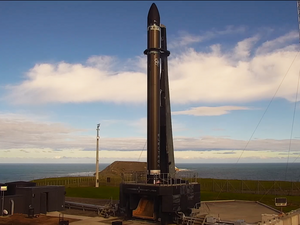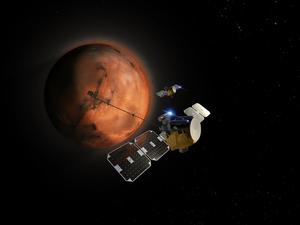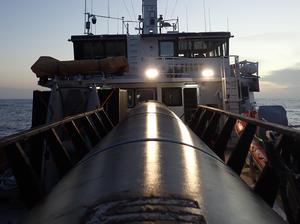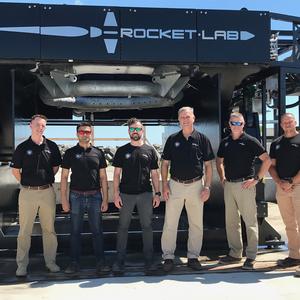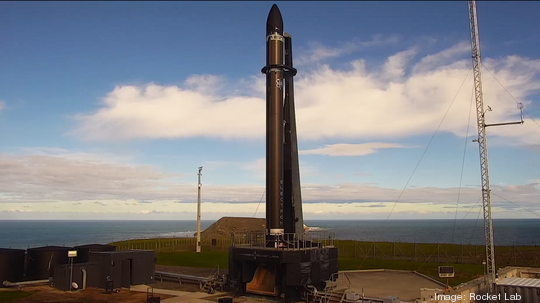
Ten weeks after losing its last mission, Rocket Lab USA Inc. could launch its next rocket as early as Wednesday night.
The Long Beach, California-based aerospace company will open a 12-day launch window for a mission for the U.S. Space Force from Launch Complex 1 in New Zealand on July 29 at 6 p.m. — that’s July 28 at 11 p.m. Pacific time.
Called “It’s a Little Chile Up Here,” the dedicated mission calls for an Electron rocket to deploy an Air Force Research Laboratory-sponsored demonstration satellite called Monolith to low Earth orbit.
The mission was originally supposed to be Rocket Lab’s inaugural launch from U.S. soil, lifting off from Launch Complex 2 (LC-2) at the Mid-Atlantic Regional Spaceport on NASA’s Wallops Island, Virginia, in the first quarter of 2020. However, NASA didn’t complete the certification processes for the autonomous flight termination system in time, so the mission was delayed and moved to Launch Complex 1 (LC-1) in New Zealand.
Here’s more from Rocket Lab about its latest payload:
The satellite will explore and demonstrate the use of a deployable sensor, where the sensor’s mass is a substantial fraction of the total mass of the spacecraft, changing the spacecraft’s dynamic properties and testing ability to maintain spacecraft attitude control. Analysis from the use of a deployable sensor aims to enable the use of smaller satellite buses when building future deployable sensors such as weather satellites, thereby reducing the cost, complexity and development timelines. The satellite will also provide a platform to test future space protection capabilities.
The latest mission was procured by the Department of Defense (DoD) Space Test Program (STP) and the Rocket Systems Launch Program (RSLP), in partnership with the Defense Innovation Unit (DIU) as part of the Rapid Agile Launch Initiative (RALI), and is being managed by the Launch Enterprise’s Small Launch and Targets Division. The tongue-in-cheek mission name is a nod to the beloved green chile of New Mexico where the Space Test Program is based at Kirtland Air Force Base.
Rocket Lab also launched a mission called “That’s a Funny Looking Cactus” for the U.S. Air Force back in May 2019, deploying three research and development satellites for the Space Test Program.
“We’re proud to once again demonstrate the flexible and resilient space access required by our government partners,” said Rocket Lab CEO and founder Peter Beck in a statement.
“It’s a Little Chile Up Here” marks Rocket Lab’s fourth launch of the year and 21st Electron launch overall.
Back on the pad
Rocket Lab’s latest mission comes after the company completed its review of the anomaly during its 20th mission on May 15 that resulted in the loss of its payload, identifying the root cause and putting corrective measures in place.
The mission, dubbed “Running Out of Toes,” launched at 4:11 a.m. Pacific time from Launch Complex 1 on New Zealand's Māhia Peninsula with a successful lift-off, first-stage burn, stage separation and second-stage ignition.
But almost 200 seconds into the flight, the second stage ignited then veered sharply off screen of the live feed. Rocket Lab confirmed in June, “Shortly after the stage two ignition, the engine computer detected that conditions for flight were not met and performed a safe shut down.”
Onboard — and lost — were the second and third of nine BlackSky Earth-observation microsatellites scheduled to launch with Electron this year.
The company said the second stage remained within its planned launch corridor and didn’t endanger the public, its teams or the launch site.
Meanwhile, the secondary objective of the mission — Rocket Lab’s second attempt to recover the rocket booster — proceeded as planned.
Rocket Lab said last week that it has since been able to replicate the issue in testing and has added redundancies to the ignition system to prevent it from happening again, including modifying the igniter’s design and manufacture.
With these changes in place, the company said it has “an even more reliable launch vehicle” and plans to resume its busy launch schedule in the second half of the year, starting with “It’s a Little Chile Up Here.”
